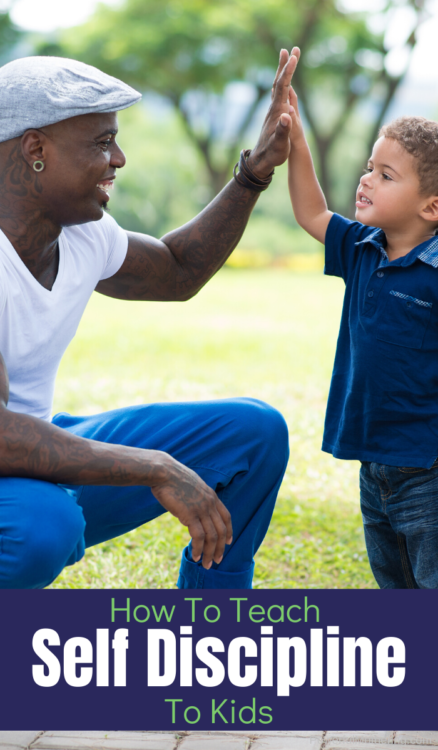This post may contain affiliate links. If you use these links to buy something we earn a commission at no extra cost to you. Powerful Mothering is supported by its audience, thankyou!
Kids can benefit if they learn about self-improvement at a young age. One of the most important gifts you can give your child is a definite sense of self. Self-development not only makes a child feel loved but also helps them develop into a productive and happy individual. It might seem overwhelming figuring out how to teach your child about self-development, but below are some strategies to make it easier. These strategies will help you promote self discipline in kids and raise positive children who are devoted to becoming the best version of themselves.

Promoting Self Improvement In Your Kids
Balance Self-improvement with Self-acceptance
It is essential to teach your children that they should love themselves, but that they can also strive to improve. You don’t want them to think that they can only be happy if they look perfect or get an A+ in class.
Help Your Child Identify Their Core Strengths
You should ask your child to list down things that they appreciate about themselves. This will help them identify those qualities that resemble their core strengths. While it’s healthy for children to think they look pretty, they need to also understand that they should expand their views of themselves beyond looks.
Did you know it is okay for kids to be bored? Check out why here.
Identify The Areas For Improvement
Whether your child wants to become friendlier with other kids or improve their basketball skills, you can work with them to identify those areas. Once identified, make a list of concrete steps to help work on those areas. Self-awareness generally isn’t something a child easily develops on their own. A parent or teacher can help tremendously in this area. Remind them that we all have areas where we could improve and this is part of being human. It’s not necessarily bad, but more of a part of life.
Keep Talking
Conversation is the key to a good relationship with your child. You can talk about areas were your child excels and ways to work on other areas where they could improve. For example, if your child says they are shy, you can role play how to talk to someone new. You can also talk about what they would like someone to do for them if they were in a new situation. Once they’ve talked through this you can remind them that they could do this same thing for other kids because other kids probably feel similar to them.
Praise Things Within Your Child’s Control
You might think you are building your child up by saying you are so smart (we’ve all done it), but applauding them for what they don’t truly have control over might not be the best way. Instead, you can praise them for how hard they work at a problem or for not giving up. This is different than what most of us are used to, but praising your child for the efforts he or she gives is important and meaningful to them.
Together Set Goals
If you want to teach self discipline to kids, you must remember that it’s healthy for them to consistently work toward goals. The aim or the goal can be anything from “I want to learn a board game” to “I want to excel in a particular subject.” You need to help your child in identifying these objectives and also offer some guidance in setting realistic goals. You can help them to stay motivated by teaching them to keep track of their final goal as well as the progress.
Debrief After Events
Regardless of whether your child succeeds or fails, the way they perceive the event determines how much they learn. Whether it’s a school performance or interaction with a new classmate, you can talk to your child about their experience. If they scored well in academics, ask them how they feel and celebrate their progress. The goal is not just to celebrate the growth but to also analyze what they can do better. This means an open dialogue where you have conversations and also look for teachable moments.
Encourage Problem Solving
If you micro-manage their activities by fixing things at the first sign of trouble, you could be robbing your child of the opportunity to solve their own problem. This behavior is typical for the majority of parents because you want to make life easier for your child. If a child says that their history homework is too difficult, you could ask your child what they can do to solve their issue. Hopefully they will come up with different solutions, but if not you can offer them different options. Also, talk about approaching difficulties as an opportunity to learn and grow, and not just as a problem to be dealt with. Each issue your child faces allows them to improve themselves.
Teach Healthy Self-talk
Your child must learn how to speak with compassion to themself. It won’t help them if they call themselves stupid after making a mistake. When you hear your child saying negative things about themselves, you have to ensure they think optimistically. You can reassure them and help them be a cheerleader for themself.
Coach your child
Another tip for self discipline in kids is to be involved. Your child may need a lesson on humility or need to brush up their manners. Every time they face a problem, you have an opportunity to coach them. Coaching can be in any form. You can motivate them by telling them they can improve at something by focusing on it or by gently reminding them about their goals. Avoid the temptation to protect your child from problems. Instead, turn failures into opportunities for self-growth.
Empower your child
Self-improvement doesn’t mean that your child has to be the smartest in the class. Self-improving means that your child can improve by taking small steps to make a positive difference in the world. Help your child improve themself by providing guidance. Apart from guiding them, it’s also important to remember that “more is caught than taught” so we need to be good examples as well.
You may also like our Raising Girls Series or our Raising Boys Series









Carol says
So terrific & usable.
THANKS